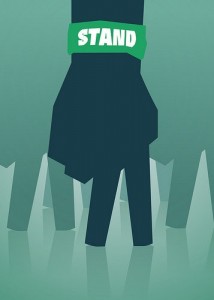Tuesday
May252010
Middle East/Iran Analysis: How the US Has Lost (Narwani)
 Tuesday, May 25, 2010 at 8:34
Tuesday, May 25, 2010 at 8:34  Sharmine Narwani writes in The Huffington Post:
Sharmine Narwani writes in The Huffington Post:It's official. There is no longer any serious "cost" for defying the United States in the global arena. Unable to win wars or deliver diplomatic coups - and struggling to maintain our economic equilibrium --- Washington has lost the fundamental tools for global leadership. And no place does this impotence manifest more vividly than the modern Middle East.
Our pointless and protracted wars in Afghanistan and Iraq will be the last time we will launch a major battle in the region. That massive show of flexing brawn over brain burst a global perception bubble about our intentions, capabilities and reason.
This credibility was compromised further with our irrational support of Israel's attacks on Lebanon and Gaza in 2006 and 2008/9 respectively. And it has eroded with the double standards employed over Israel's violations of international law and its illegal nuclear weapons stash, particularly when viewed against the backdrop of our startling rhetoric over Iran's nuclear program.
But nothing highlights our irrelevance more than two recent developments:
1) The US's inability today to convene even perfunctory peace talks between Israelis and Palestinians, let alone push through a negotiated solution --- and this after 19 years of a "US-sponsored" peace process.
2) The US's inability to achieve a resolution with Iran over its nuclear program. The only breakthrough in this long-winded effort to tame Iran's nuclear aspirations was struck by Turkey and Brazil last week.
In short, the US seems incapable of resolving even a traffic dispute in the Middle East. It is Qatar that stepped in to broker a deal between Hezbollah and the Lebanese government in 2008, and is knee deep in negotiating a solution to the conflict in Darfur. Syria helped gain the release of prisoners in Iran and Gaza. And now Turkey and Brazil have cajoled Iran into accepting an agreement that the US, France, England, Germany, Russia and China could not.
We have been rendered irrelevant, despite our insistence on involving ourselves with every peep heard in the Mideast.
The Iran Nuclear Fiasco
After pushing for the nuclear swap deal with Iran since last October, we did an about turn and scorned the very same "confidence building" measure we had touted while simultaneously accusing Iran of bad intentions and negotiations trickery.
And we openly sneered at the valiant effort of two important UN Security Council member states --- one a NATO-member and the other the largest economy in our Latin American backyard --- to troubleshoot on behalf of the global community. The very next day, we childishly chose to undermine this important breakthrough by announcing an agreement on UN Security Council draft sanctions against Iran.
The fact is that no one other than England, France, Germany and Israel seems to want us to win this fight anymore. This is increasingly being viewed as a David vs. Goliath standoff, with Iran as the David, and its nuclear energy program a sacrificial lamb that is meant to appease our substantial ego as the world's remaining superpower.
Pundits and analysts, such as Pierre Tristam, James Lindsay and Ray Takeyh, are even starting to argue for making room for a nuclear Iran --- all thanks to our unwavering scrutiny of this issue.
Indian External Affairs Minister S. M. Krishna said in Tehran two days after the nuclear swap deal was struck, "India praises Iran for fighting for its interests... We are both developing nations and we should make use of each other's capabilities and experiences in order to make progress."
These so-called "Middle States" like Brazil, India, and Turkey are regional economic and political hegemons with collective clout --- certainly more so than the waning authority of our European partners who are dealing with weak economies and uninspired geopolitical thinking, much like our own.
Who needs us when all we seem to bring to the table is bluster, threats and our dubious "hard power?" The "regional hegemons" have demonstrated that the cleverly-wielded soft power of diplomacy goes a lot further in easing tensions globally and creating vibrant trade and economic conditions across borders.
No Consequence to Defying the US
In a very significant perception shift, many of these countries are beginning to realize that there is no longer a "cost" to ignoring US threats.
This reality is swiftly becoming apparent in the Middle East. What have several rounds of Security Council sanctions done to harm Iran thus far? Iran has just learned to be more self-sufficient and our constant bullying has earned it a permanent global podium from which it has rallied impressive developing nation alliances from countries that admire its struggle and resolve.
And the Arab world, once hostile to Iran and its brand of Islamic government, has also warmed to the idea of a new regional worldview that rejects an aggressive American role and embraces a homegrown narrative that more honestly addresses their problems. Hence the growing influence of the Iran, Syria, Hezbollah, and Hamas mindset, bolstered by their good relations with rising regional stars like Turkey and Qatar and the widespread support of the Arab and Muslim Street.
But more importantly, traditional US allies like Saudi Arabia and Lebanon are slowly shifting strategies. Both have sought rapprochement with Syria and appeasement of Iran in some form this past year. Lebanon has defended Hezbollah's right to maintain its weapons so long as a belligerent Israel exists down south. Saudi Arabia and Syria worked together to ensure a smooth, crisis-free election in Lebanon last June, and helped broker the formation of a government in its aftermath - with Iran giving its blessings along the way. And there is increased disunity amongst the six pro-US Arab nations of the Persian Gulf on whether Iran poses a serious threat in the region.
Perceptions Altered --- Can We Adapt Fast Enough?
A recent article in Foreign Policy magazine by Aaron David Miller argues that the Mideast climate has changed and therefore the US should examine its participation in regional affairs, specifically the peace process. Miller also warns:
The broader Middle East is littered with the remains of great powers that wrongly believed they could impose their will on small tribes. Iraq, Afghanistan, Iran...need I continue? Small tribes will always be meaner, tougher, and longer-winded than U.S. diplomats because it's their neighborhood and their survival; they will always have a greater stake in the outcome of their struggle than the great power thousands of miles away with many other things to do.
As we contract economically and our appetite for waging wars shrinks, those who resist our policies in the Middle East can flex their influence with fair certainty that we will not and can not retaliate effectively.
With no real cost to bear, the sympathy of the larger international community, and now a genuine compromise to wave in front of detractors, Iran is sitting pretty, leaving us to look like a churlish, patronizing bully that chooses to lead with club in hand.
In a rapidly changing Middle East, this fight with Iran is just churning up trouble for us and underlining our own shrinking relevance on the world stage. Iran's deal with Turkey and Brazil and our subsequent sanctions threat has demonstrated conclusively that the US is not necessary for brokering deals and may in fact be an impediment to conflict resolution.
And this perception makes our regional allies uncomfortable enough to investigate their options, specifically, dealing with those we call our foes. Regional state and non-state actors will be taking note of the against-all-odds success of the tripartite deal and wondering if they should look more locally for Arab-Israeli peacebrokering too.
The US needs to take a page out of Turkish Foreign Minister Ahmet Davutoglu's foreign policy playbook before taking another false step in the Mideast. This is geopolitical thought leadership the likes of which we haven't seen in more than half a century.
You could call it Diplomacy 101. I'd like to call it our "last chance to practice what we preach".



